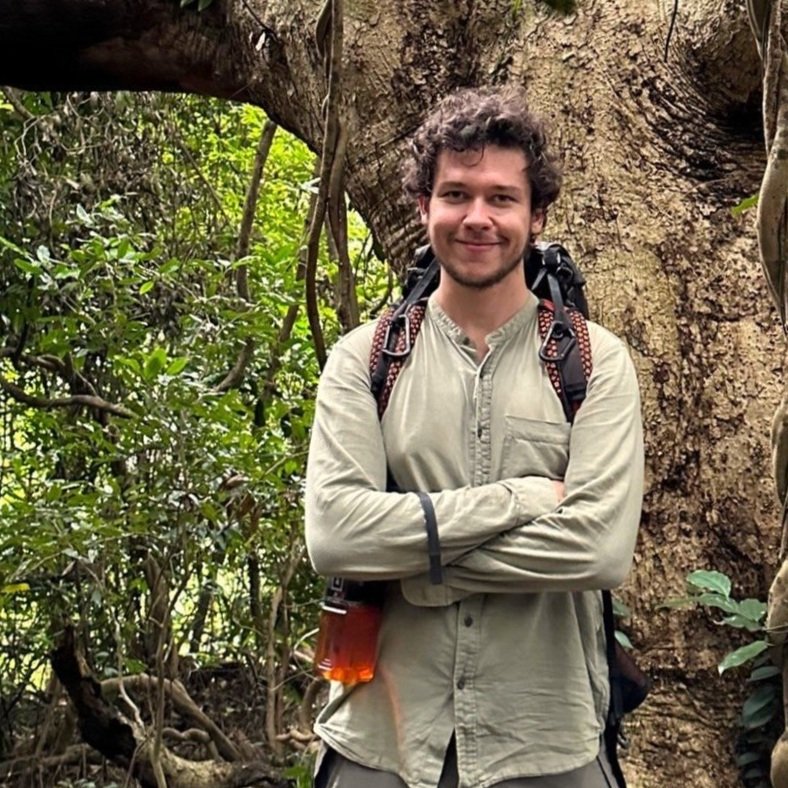Postdoctoral Researchers
-

Michael J W Boyle
-

Adam Sharp
-

Alexey Reschchikov
-

Martha J Ledger
-

Michel Dongmo
-

Xiaoyi Zeng
-

Coskun Güçlü
Postgraduates
-

Clara Park
Nature has always been my calling, so one field season was all it took to progress from biochemistry to this field. Wasps are underappreciated by the public, and have so much more to offer than the big, angry, black and yellow stereotype. That is why my MPhil project will focus on species distribution modelling and the potential impact of climate change.
Contact: clarapark.jh@gmail.com
-

Theodora Chan
I have always been interested in studying the relationships between different species within a community, especially between plants and other taxa, such as pollinator insects and fungi. I also enjoy investigating topics such as forest succession and restoration. My research focuses on comparing the habitat structures of different Hong Kong forests under active restoration. I am currently studying the improvement in ecosystem functioning by forest restoration in terms of pollination, mycorrhizal relations and soil properties. I am seeking to identify the key obstacles to restoration in tropical Asia, with the ultimate goal of upscaling ecological restoration for conserving biodiversity and sustaining ecosystem services.
-

Nok Lam (Chloe) Yuen
I’m interested in understanding how climate change and land-use change affect biodiversity and associated ecosystem services. Previously, termites have been found important in buffering the effects of drought in primary tropical rainforests by increasing soil moisture, decomposition, soil nutrient heterogeneity and seedling survival, however, whether termites could also confer resilience to drought in disturbed habitats is still not understood. Therefore, in my research, I will conduct experiments in Sabah, Malaysia to quantify the effects of land-use change and drought on the ecosystem services provided by termites.
Contact: nlyuen@connect.hku.hk
-

Ruiming Nie
Tropical forests are more important than people generally realise. As one of the most diverse ecological environments on earth, tropical forests play a critical role in regulating the greenhouse effect by absorbing carbon dioxide and influencing local rainfall patterns through water evaporation control. My research primarily focuses on two main areas: (1) the relationship between different successional stages of tropical forests and insect diversity, and (2) how insect diversity changes in tropical rainforests over time and in response to extreme climate events, anthropogenic activities, and other influencing factors. My PhD study focuses on tropical rainforests in Malaysia. The goal of my research is to gain a better understanding of the successional processes and the role of insect diversity in tropical rainforests, thereby providing a more reliable theoretical basis for developing effective conservation measures.
-

Victoria Amaral
Growing up amidst the rapid urban sprawl of the American South, I watched bulldozers clear meadows for McMansions and felt the first pangs of environmental grief. This led me to question the ways in which we interact with urban spaces, and, searching for a more mutually habitable system that could support both humans and wildlife, I found my way towards a career in Ecology. This has led me further from home than I ever expected- Hong Kong, the brightest city in the world! My research will focus on the impact of artificial light at night on moth communities. As cities expand and the earth continues to urbanize, it’s important to ask: what will result from diminishing darkness?
Contact: veamaral@connect.hku.hk
-

Bartosz Majcher
I am a PhD candidate in Biodiversity and Environmental Change Lab at The University of Hong Kong. In my research I focus on understanding thermoregulation and drivers of temperature vulnerability and preferences of ectotherms and their implications for ecosystem functioning. I combine fine scale thermal physiology measurements of arthropods and plants with a variety of field methods involving canopy access, habitat microclimate measurements, and forest structure modelling using LIDAR. I aim at better understanding the realised impacts of global warming, identifying temperature vulnerability, and exploring the importance and conservation potential of microclimate-buffered habitats. In my free time I like walking and listening to folk music.
Contact: - bmajcher@connect.hku.hk
Twitter: @bartreesre
Lab Associates
Dr Elliot Leach
I’ve been interested in the natural world from a very young age. Initially intrigued by arthropods, my focus has expanded over the last 15 years to include most forms of life - even plants! I completed a PhD on the birds of the Gondwana Rainforests of Australia World Heritage Area in 2018. I currently work as a consulting ecologist based in Brisbane but have been fortunate enough to maintain a connection to academia through my great friend and frequent collaborator Louise Ashton!
Lab Alumni
Postdocs
Dr Birhanu Sisay
My work focuses on understanding the ecological roles of biogenic volatile organic compounds released by subtropical and tropical forest trees under biotic and abiotic stress. Additionally, my research encompasses a wide-ranging interest, including aspects such as insect pheromonal communication and the biological control of insect pests using predators, parasitoids, and entomopathogens.
Wenda Cheng
During my PhD, I focused on Lepidopera behavioural and distribution responses under climate change. Now as a postdoc, I'm eager to know how will species interactions respond under multiple environmental stressors including temperature and precipitation at both species and assemblage levels. I'm also interested in broad conservation issues in Asia. For more info please visit my website.
Postgraduates
Brinna Barlow
Following a BSc in Environmental Biology, I spent a few years deciding whether to pursue entomology or marine biology professionally. Several dive certifications and terrestrial field seasons later my mind was made up. I completed an Msc in Entomology at Harper Adams university in September 2018, having secured my place at Hong Kong university earlier in the year. During my time at HKU I studied how environmental gradients influenced invertebrate trophic interactions to further our understanding of how environmental change can impact ecosystem functions.
brinna.barlow@gmail.com
Research Assistants
Woo Sing Yi, Betty
Generally I am interested in urban ecology, specifically how insect communities respond to anthropogenic impacts. Besides research, I have been involved in science communication and environmental education projects, promoting the city’s rich biodiversity to the public.






